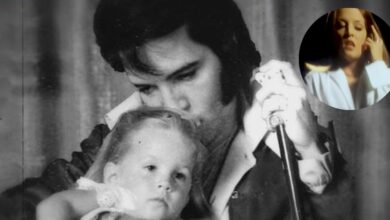Elvis’ Voice Achieves a Level of Absolute Perfection Never to Be Matched
Elvis Presley’s rendition of “Big Boss Man” stands as a testament to his versatility as an artist and his ability to reinterpret blues classics through his own distinctive style. Born in Tupelo, Mississippi, in 1935, Elvis’s early exposure to gospel music and his passion for rhythm and blues laid the foundation for his groundbreaking career in music. Emerging as a cultural icon in the 1950s, Elvis’s fusion of rockabilly, gospel, and blues elements reshaped the landscape of popular music and earned him a devoted global following.
Originally penned by Luther Dixon and Al Smith, “Big Boss Man” was first recorded by Jimmy Reed in 1960, establishing itself as a blues standard. Elvis Presley’s version, recorded in 1967 for the album “Clambake,” injected a new energy and charisma into the song. Known for his magnetic stage presence and emotive vocals, Elvis brought a raw intensity to “Big Boss Man,” reflecting the song’s narrative of a tough and demanding authority figure.
The alternate take of “Big Boss Man,” featured on the 1999 reissue of “Clambake,” offers listeners a different perspective on Elvis’s interpretation. This version incorporates a more pronounced horn section and a bluesier guitar solo, enriching the song with additional layers of musical texture and energy. Elvis’s vocal delivery on the alternate take is notably more aggressive and impassioned, characterized by growls and snarls that underscore the defiance and rebellion inherent in the lyrics.
Throughout his career, Elvis Presley’s ability to connect deeply with his audience was a hallmark of his performances. His rendition of “Big Boss Man” exemplifies this connection, as he channels the song’s themes of authority and resistance with authenticity and conviction. The song’s narrative resonated with Elvis’s rebellious image, aligning perfectly with his persona as a cultural provocateur who challenged conventions both on and off the stage.
Beyond his musical achievements, Elvis’s impact on popular culture transcended his role as a singer and actor. His influence extended to fashion, film, and societal norms, making him a global phenomenon whose legacy continues to resonate today. Elvis’s collaborations with renowned musicians and producers further showcased his versatility and adaptability within diverse musical genres, ensuring his relevance across generations.
The alternate take of “Big Boss Man” serves as a testament to Elvis Presley’s enduring influence on the blues and rock music landscapes. By infusing the song with his own unique style and personality, Elvis revitalized a classic blues standard, making it accessible to new audiences while honoring its roots. His ability to blend traditional blues elements with contemporary flair solidified his reputation as a pioneer of rock and roll, leaving an indelible mark on the evolution of popular music.
In conclusion, Elvis Presley’s alternate take of “Big Boss Man” exemplifies his unparalleled ability to reinterpret and revitalize classic blues songs. With his distinctive vocal prowess and magnetic stage presence, Elvis transformed “Big Boss Man” into a dynamic showcase of his artistic range and emotional depth. As listeners revisit this iconic track, they are reminded of Elvis Presley’s lasting impact on music history and his enduring legacy as a trailblazer in the world of popular music.



